Thanksgiving is a holiday centered on family, friends, and food, and pets are no exception. They love to participate in the hubbub and often use the opportunity as a chance to fly under the radar. While you’re busy cooking, eating, or chatting with partygoers, your furry pal may be sneaking food from the table, begging for scraps, stealing trash, or escaping from your home.
The Palm City Animal Medical Center team knows these scenarios can land pets in the emergency veterinary hospital, a situation that could easily ruin an otherwise delightful Turkey Day. To spare pet owners the stress of seeing their beloved four-legged friend get sick, we’ve prepared a list of common Thanksgiving pet emergencies and ways you can prevent them.
#1: Pancreatitis in pets
Pancreatitis is a painful, inflammatory condition affecting the pancreas that can happen quickly (i.e., acute) or over a long time period (i.e., chronic). One of the major causes of acute pancreatitis is a sudden diet change, particularly the addition of fatty foods or treats for pets who normally eat a lower-fat diet. The fat ingestion triggers the pancreas to prematurely activate digestive enzymes, which damage the pancreatic cells and surrounding tissues. Common signs include vomiting, diarrhea, fever, and belly pain. In the worst-case scenario, chemicals released from the damaged cells can travel through the bloodstream and cause clotting problems, organ failure, and death.
Some pets are more likely to develop pancreatitis than others, including miniature schnauzers and pets with diabetes or other endocrine disorders. To be safe, avoid feeding any pet dark turkey meat, turkey skin, bacon, or other fatty scraps on Thanksgiving.
#2: Foreign body obstruction in pets
A foreign body obstruction results when pets eat something they cannot adequately digest, such as a bone, which then gets stuck in their stomach or intestines and halts the normal forward food movement through the gastrointestinal (GI) tract. Pets with such an obstruction cannot keep down food or water and may show signs of pain or have a fever. Without surgery to remove the obstruction, a pet could die. They also risk serious systemic illness if the swallowed object pokes a hole in the GI tract, causing bacteria to leak into the abdomen. Do not allow pets to chew on cooked meat bones, which often splinter, and promptly remove trash before pets have a chance to go dumpster diving.
#3: Gastroenteritis in pets
Gastroenteritis is an irritation of the GI tract that occurs after your pet eats something that disagrees with them, causing vomiting and diarrhea. This is mild and self-limiting in many cases, but it can cause dehydration or blood loss (i.e., hemorrhagic gastroenteritis) in some pets—typically smaller breeds. Do not share table food with pets on Thanksgiving, especially if they historically have had a sensitive stomach.
#4: Poisoning in pets
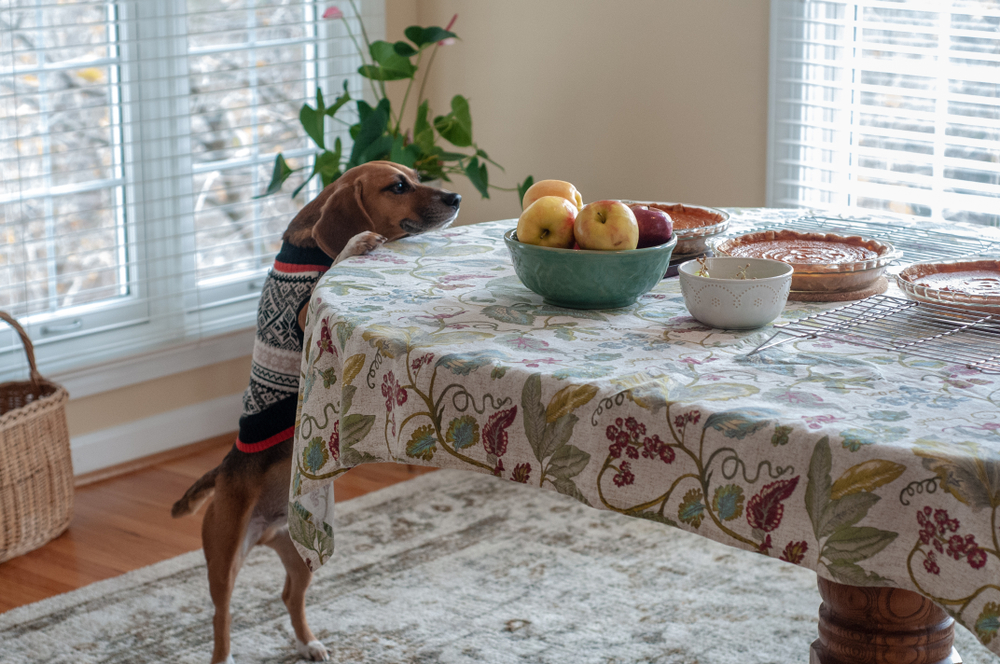
Many human foods are toxic to pets, including chocolate, xylitol, garlic, onions, and raisins. Effects vary depending on the toxin and how much the pet consumes. Keep any food containing toxic ingredients out of your pet’s reach, or, better yet, ban your pet from the kitchen entirely. Typical effects of toxic foods may include:
- For chocolate — Vomiting, tremors, hyperthermia, heart arrhythmias, seizures, coma, or death
- For xylitol — Hypoglycemia (i.e., low blood sugar), vomiting, depression, seizures, collapse, or liver damage
- For garlic and onions — Red blood cell damage, low hemoglobin, or anemia.
- For raisins — Kidney failure
Additionally, some plants and flowers can be toxic if pets chew on or consume any parts of them. Lilies can cause rapid kidney failure or death in cats, and bittersweet may cause stomach upset. Consult the ASPCA list of toxic and non-toxic plants to determine which are safe for your holiday tabletop displays or use faux alternatives.
Pets who consume a toxic substance require immediate emergency care, even if they do not appear sick. Some effects can be delayed, but the sooner treatment begins, the better. Hospitalization may be required for several days following a poisoning event.
You can safeguard your pet’s health and ensure an enjoyable holiday for all by avoiding the common pet scenarios listed above. For extra mischievous pets who find themselves feeling unwell despite your best efforts, contact Palm City Animal Medical Center for help. In addition to our regular staff hours, our clinic offers on-call after-hours services—do not hesitate to contact us at any time. For poisonings, contact the ASPCA Animal Poison Control Center or Pet Poison Helpline before going to or while en route to the veterinary hospital for the best chance of successful treatment.

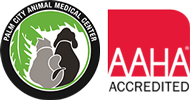
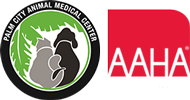

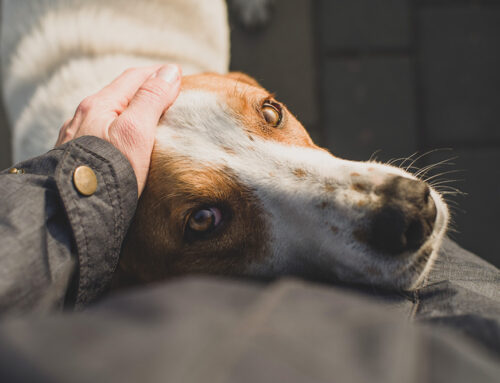
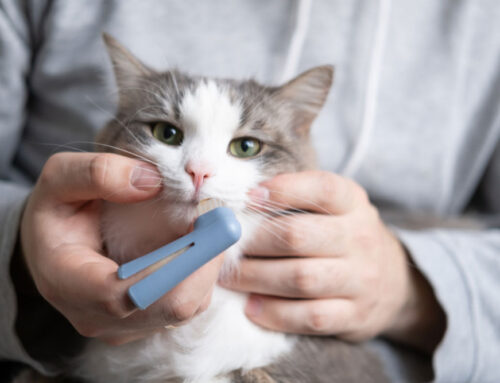


Leave A Comment